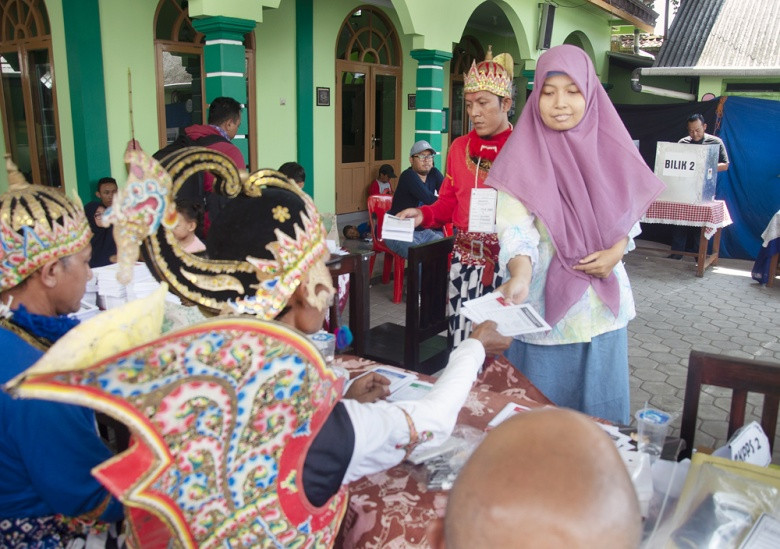Popular Reads
Top Results
Can't find what you're looking for?
View all search resultsPopular Reads
Top Results
Can't find what you're looking for?
View all search resultsChallenge from within
The PDI-P clearly benefits from a less powerful KPK. The latest case in point is the KPK’s ongoing investigation into alleged bribery surrounding a PDI-P member.
Change text size
Gift Premium Articles
to Anyone
 Festive election: Dressed in traditional Javanese attire, poll workers serve voters in Giwangan subdistrict in Yogyakarta in the April 2019 legislative election. The Indonesian Democratic Party of Struggle (PDI-P) has sparked a controversy for demanding the reinstatement of the closed-list electoral system. (JP/Tarko Sudiarno)
Festive election: Dressed in traditional Javanese attire, poll workers serve voters in Giwangan subdistrict in Yogyakarta in the April 2019 legislative election. The Indonesian Democratic Party of Struggle (PDI-P) has sparked a controversy for demanding the reinstatement of the closed-list electoral system. (JP/Tarko Sudiarno)
T
he Indonesian Democratic Party of Struggle (PDI-P) had endured peaks and valleys throughout 47 years of existence. Born in 1973 out of a merger of five political parties — the Indonesian National Party (PNI), the Independence Vanguard Party (IPKI), the Proletarian Consensus (Murba) Party, the Indonesian Christian Party (Parkindo) and the Indonesian Catholic Party — the PDI-P may have been the one that suffered the most throughout the three-decade rule of Soeharto’s New Order.
Following a regime change and improvements in the election system during the 1998 reform movement, the PDI-P has seen a steadily improving performance. It is currently on top with its own member, President Joko “Jokowi” Widodo, leading the country. It also won the most seats in the House of Representatives in the 2014 and 2019 elections.
However, as our Special Report today underlines, the last few years witnessed how the PDI-P has struggled to live up to its name. The party, for example, led the ruling coalition’s push for a revision of Law No. 30/2002 on the Corruption Eradication Commission (KPK). Ironically, the old KPK Law was enacted during the presidency of Megawati Soekarnoputri, a long-time PDI-P chairperson.
Read also: PDI-P’s transformation: From complementary entity to political stardom
The amended legislation, Law No. 19/2019, is indeed controversial. Syamsuddin Haris, a member of the KPK supervisory council — a supreme body within the KPK that was recently established as a result of the KPK Law revision — has admitted that the new law weakens the antigraft body.
The PDI-P clearly benefits from a less powerful KPK. The latest case in point is the KPK’s ongoing investigation into alleged bribery surrounding a PDI-P member. The KPK arrested a General Elections Commission commissioner for allegedly accepting Rp 600 million (US$43,950) from PDI-P legislative candidate Harun Masiku, who is still at large.
The PDI-P has also been accused of tampering with the KPK investigation into the case, which implicates the party’s secretary-general, Hasto Kristiyanto. To make matters worse, a group of academics has initiated an online petition to ask for the dismissal of Law and Human Rights Minister Yasonna Laoly, who is a PDI-P politician, for alleged obstruction of justice in the graft case.
Apart from the KPK Law, the PDI-P was also behind an initiative to amend the 1945 Constitution by reinstating the State Policy Guidelines (GBHN), operational guidelines issued by the People’s Consultative Assembly in the form of a mandate for a president to perform his constitutional duties. The GBHN, which was, part of a key the New Order, was removed during the reform movement along with the revocation of the assembly’s status as the supreme lawmaking authority.
Surely the PDI-P is now at its peak performance. Unless it resists the temptation to hold onto power through “undemocratic” means, we might see the party’s collapse sooner or later.









